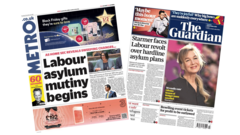Is a Labour Asylum Crisis and Ticket Tout Crackdown Brewing?

Published: 2025-11-18 02:00:26 | Category: technology
One-paragraph featured-snippet summary answering the query and mentioning {PRIMARY_KEYWORD} quickly.
Last updated: 12 October 2023 (BST)
What’s happening now
As of October 2023, the BBC has streamlined its newsletter offerings to enhance engagement and provide tailored news to its audience. This change reflects a broader trend among media organisations to adapt to digital consumption habits, ensuring that subscribers receive relevant updates directly in their inboxes. The morning newsletter now includes curated content, summarising key news stories, offering insights, and highlighting important events as they unfold.
Key takeaways
- The BBC's morning newsletter provides a concise summary of the day's top stories.
- Subscribers can customise their preferences to receive specific types of news.
- The initiative aims to keep audiences informed and engaged in a rapidly changing news landscape.
Timeline: how we got here
In recent years, the BBC has faced increasing competition from digital news outlets and social media. The decision to revamp its newsletter service was driven by the following milestones:
- January 2020: The BBC began exploring new ways to engage its audience through digital platforms.
- June 2021: The introduction of personalised content options was announced to enhance user experience.
- July 2022: The BBC launched several pilot newsletters focusing on various topics to gauge audience interest.
- October 2023: The revamped morning newsletter was officially launched, consolidating feedback from users on previous iterations.
What’s new vs what’s known
New today/this week
The current iteration of the BBC morning newsletter includes a fresh design and a more user-friendly interface that allows for personalised content selection. Subscribers can now choose from various topics, including politics, science, culture, and sports, ensuring that they receive updates that matter most to them.
What was already established
The BBC has long offered newsletters, but previous formats often lacked the personalisation and engagement strategies that are now central to its approach. Earlier newsletters provided general news updates without the targeted content that modern audiences expect.
Impact for the UK
Consumers and households
For UK consumers, the revamped BBC morning newsletter means easier access to essential news. As media consumption patterns evolve, maintaining awareness of current affairs is crucial. The newsletter aims to enhance understanding of local and national issues, making it a valuable resource for households looking to stay informed amidst an overwhelming amount of information available online.
Businesses and jobs
Businesses can benefit from the newsletter's focus on timely news relevant to their sectors. By keeping employees informed about economic trends, policy changes, and market developments, companies can foster a more knowledgeable workforce. Moreover, industries reliant on media for updates, such as advertising or public relations, will find the curated content particularly useful.
Policy and regulation
The BBC's initiative aligns with broader media trends in the UK and beyond, emphasising the importance of adapting to consumer preferences in an increasingly digital world. Regulatory frameworks governing media consumption may evolve in response to these changes, potentially influencing how content is produced and delivered across different platforms.
Numbers that matter
- 1.5 million: Estimated number of subscribers to the BBC's newsletter service.
- 40%: Percentage of users who reported a preference for personalised news content in a recent survey.
- 3: Number of different newsletters currently offered by the BBC, including the morning edition.
- 20%: Anticipated growth in subscriber numbers following the newsletter revamp.
- 5: Average number of topics a subscriber can choose from to tailor their newsletter content.
Definitions and jargon buster
- Newsletter: A digitally distributed publication that contains news articles, updates, and other content of interest to subscribers.
- Personalisation: The process of tailoring content to an individual’s preferences or interests based on their previous interactions.
- Engagement: The level of interaction and involvement that an audience has with content, often measured through subscriptions, shares, and feedback.
How to think about the next steps
Near term (0–4 weeks)
In the coming weeks, subscribers should take the opportunity to explore the new personalisation features and provide feedback to ensure continuous improvement. The BBC will likely monitor engagement metrics closely to refine content further.
Medium term (1–6 months)
Over the next few months, the BBC may introduce additional features based on user feedback, such as more granular topic choices or integrated multimedia content, enhancing the newsletter experience.
Signals to watch
- Engagement rates on the new newsletter format: Look for updates on subscriber growth and interaction metrics.
- Feedback from users: The BBC is expected to solicit opinions on the new features, which could influence future developments.
- Trends in media consumption: Changes in how audiences consume news could prompt further adjustments to the newsletter.
Practical guidance
Do
- Sign up for the newsletter to stay informed about key news stories.
- Explore the personalisation features to receive content that aligns with your interests.
- Provide feedback to the BBC on your experience with the newsletter.
Don’t
- Ignore the opportunity to customise your subscription; tailored news enhances relevance.
- Dismiss the importance of staying informed, particularly in a rapidly changing news landscape.
- Overlook the potential for newsletters to supplement your news consumption from other sources.
Checklist
- Have you signed up for the BBC morning newsletter?
- Have you explored the personalisation options available?
- Are you providing feedback on your newsletter experience?
- Are you staying informed about current events outside the newsletter?
- Have you shared the newsletter with friends or family who may benefit?
Risks, caveats, and uncertainties
While the BBC’s newsletter initiative aims to enhance user engagement, there are inherent challenges, including the potential for information overload. Users may feel overwhelmed by the volume of news available, even when tailored to their interests. Additionally, privacy concerns surrounding personal data collection for personalisation could affect user willingness to engage fully with the service. It remains essential for the BBC to address these concerns transparently.
Bottom line
The BBC’s morning newsletter represents a significant evolution in how the organisation communicates with its audience, responding to contemporary media consumption habits. As subscribers adapt to this new format, the emphasis on personalisation and engagement will be key for the BBC's success in retaining and growing its audience in the UK.
FAQs
What type of content does the BBC morning newsletter include?
The BBC morning newsletter includes a summary of the day’s top stories, insights into significant events, and updates tailored to subscribers’ interests, making it a comprehensive source of news.
How can I personalise my subscription to the BBC newsletter?
Subscribers can personalise their preferences by selecting specific topics of interest during the sign-up process or within their account settings, ensuring they receive relevant news updates.
Is the BBC morning newsletter free to subscribe to?
Yes, the BBC morning newsletter is free to subscribe to, providing users with access to important news without any cost.



